The Four Biggest Myths About Writing
Or, at least, the four that annoy me the most! Come along as I debunk them!
Hello Dear Beyonders!
I’m excited about Joanna’s column this month. First of all, I always find it fascinating to catch a more intimate glimpse into the life of a writer (hence, my line of work!)! And secondly, Joanna writes about four myths that I have also spent time pondering. I bet many of you have, too! As always, Joanna explores her material with brilliance, deep consideration, and humor.
And, of course, I’m happy to see my pal Cynthia Weiner made the recommendation list! If you missed our interview, you can check it out here.
I think you will really enjoy this month’s column!
xJane
A few months ago, I posted a promo for this column on Instagram, and among the usual comments– “adding to my TBR” etc.-- I found one that stopped my heart. “My Salinger Year is my favorite book,” wrote a young woman in India (yes, I looked her up), “and I don’t understand why you’re not writing your own work anymore and instead just writing about other people’s books.”
Typing that out, as I drink my morning coffee (it’s 5:45 am and I’m sitting on my couch with Oswald, my giant poodle, while my family sleeps upstairs), I feel physically ill, my stomach tying itself in knots. For it touches on my gravest fears, fears I know, intellectually, are both completely irrational and based in misguided ideas about writing, creativity and productivity, dangerous myths that I constantly combat in my teaching, in conversations with friends, and—of course—inside my own head.
What are those myths? I’m not sure I’ve ever unpacked them publicly, perhaps because I fear—there’s that word again—the world disagrees with me. For popular–beloved! ubiquitous!--writing experts have based whole books and careers on their validity. But it’s early and I’m too tired to worry about people hating me, so here goes:
MYTH #1: Reading and writing are separate pursuits. You can write without reading, sure, but you cannot be a writer—in the sense that you’re writing for an audience—without reading. Reading makes you a writer, quite literally. (Perhaps you’ve read Jonathan Franzen’s classic essay on this subject?) I don’t mean that you need to keep up with contemporary literature out of a sense of obligation to some perceived notion of a “literary community.” I mean that in order to write, you need to be reading, widely and deeply, to constantly be in dialogue with work that is not your own, of any genre, from any era. I also don’t mean that you always need to be reading so as to take a clock apart—thinking about how structure and character and tone and style function in this book or essay or poem. (Though you may find yourself doing so.) I mean that your subconscious—the engine guiding your writing—is absorbing all those elements and feeding that mysterious entity known as your aesthetic.
MYTH #2: Writing about books is a separate pursuit from writing books. There’s a reason most novelists and memoirists and great journalists, historically, have also, written criticism. Thinking deeply about what makes a book work contributes—tremendously—to figuring out your own. In the early Oughts, when I was just gathering the courage—and securing the time and financial stability, the two being tied together for many of us—to write my first novel, A Fortunate Age, I wrote a heavy volume of criticism and author profiles for a number of newspapers. Those reviews and author interviews taught me what I wanted from a novel, which taught me how to write a novel. Particularly the pieces I wrote for Newsday, which then had a huge books section run by two legendary editors, Laurie Muchnick and Peter Terzian, who assigned books with incredible care and precision, and who had also amassed an unbelievably talented pool of regular contributors, including Claire Messud and Claire Dederer, long before they became household names, and with whom I found a kind of artistic kinship, for we seemed to share the same taste in fiction (big, ambitious, Victorian-influenced), and the same rhetorical and stylistic tendencies (bold, a bit cranky, involving long sentences and the absence of state-of-being verbs). And that kinship, too, fueled both my ambitions and my confidence in my taste.
MYTH #3: Writing about books is a promotional activity rather than a critical or creative one. (Thank you, late-stage capitalism and productivity culture!) Nearly every day, someone says something to me along the lines of “you’re such a tremendous supporter of other writers!” Or, “you’re such a great literary citizen!” And each and every time, I feel the urge to shout, “fuck you!” I’m not an idiot: I realize these are meant as compliments—expressions of gratitude—but I cannot take them as such, because, you see, if I suggest—in this column or on social media or in the New York Times Book Review—that you read X or Y book, or not even suggest that you read it, but merely explain why I loved it, my words of praise stem purely from my critical faculties, from the fires that novel ignited in my brain as a writer. Not from some personal obligation to the writer. Nor from some feeling of duty to the “literary community.” And definitely not from some desire to help writers promote their work, to act as a sort of publicist?? Can you see why this myth alarms me? Why I cringe whenever someone lobs this kind of comment my way? This misguided notion constructs the writer—me—not as an active intelligence engaged with a piece of literature, offering a carefully calibrated assessment of its cultural and societal and artistic importance, but as, let’s say, a consumer, offering up product recommendations, the way, say, Allure presents its annual Best of Beauty lists. Which we all know involve paid placement, right? But a book—though one can purchase it—is not a product. It’s art.
Does this idea stem from the all-pervasive influencer culture in which we live? Yes. But it needs to be dismantled, instantly.
Also, if you saw the number of books I’m sent each week—the number of books I’m absolutely not telling anyone to read, declining to blurb—you might think differently about me. My local little free library is overflowing with books I found so terrible—or so not my thing—I couldn’t even get past the first page.
One other, important thing: Writing about books places me—and you—in dialogue with the larger cultural world, connecting you—intellectually, artistically, and personally—to a vast web of writers, including those whose works you’re covering. These connections can, and will, save your life; they can, and will, make you a better writer. Writing, by definition, requires spending most of your time alone—maybe with your dog or cat curled by your side—and knowing you’re part of this larger enterprise serves as a psychological safety net. The more you write about books, the wider this safety net—your friends and peers in this game of words—grows. I could not survive without it. And, for me, I largely owe its existence to writing about books. If I’ve bolstered other writers—friends or strangers—along the way, that does, yes, make me happy. (I’m not a complete curmudgeon, I guess?)
MYTH #4: “Real writers” produce constantly. And publish constantly. This one is somewhat confounding, as many of the greatest writers of our time—and previous eras—spend a decade or more on their books. Chimananda Ngozi Adichie, Donna Tartt, Jonathan Franzen, Marilynne Robinson, Laurie Moore, Danzy Senna. Some of my favorite writers, too, take long periods to compose their precise, elegant fictions: Tova Mirvis, the aforementioned Claire Dederer and Claire Messud, Alice Elliott Dark, Daisy Alpert Florin, Susan Choi, David Gilbert, Tess Gunty, Elizabeth Silver, Alexander Chee, Eleanor Henderson, Michael Chabon, Kelly McMasters, Lauren Grodstein. The magnificent Elisa Albert. I could go on and on and on. And, conversely, I have read so many books that would have definitely benefited from several more drafts, from years of thinking, from—apropos of myth number one—reading more, and more thoughtfully. So many memoirs written too close to the events recounted, and thus lacking the necessary distance from the hot emotions involved, not to mention a true understanding of the actual story.
Are there writers who quickly and constantly produce great works? Obviously, yes. Curtis Sittenfeld, Jennifer Haigh (who spent many years on her epic novel Heat & Light, and whose new novel, Rabbit Moon, has been developing, slowly, for many years), J. Courtney Sullivan, the late Laurie Colwin, and surely many others who are not coming to mind (the coffee is still kicking in). But would I rather wait fifteen years for a Donna Tartt or Danzy Senna novel than a work of middling, workmanlike prose? You know the answer, Beyonders. I mean, would you?
Okay, rant over. If you’re curious about why, exactly, my new books—there are two, a memoir, The Fifth Passenger, which I must finish first, and a novel, Money or Love, to which I’m dying to return—have taken so long, drop a line in the comments and I’ll devote my next column to the backstory behind these books, which involves the making of the My Salinger Year film (fun) and long Covid (not fun!) and a host of other things, like reluctant research subjects and non-sleeping children.
And now, the books I’ve loved this month.
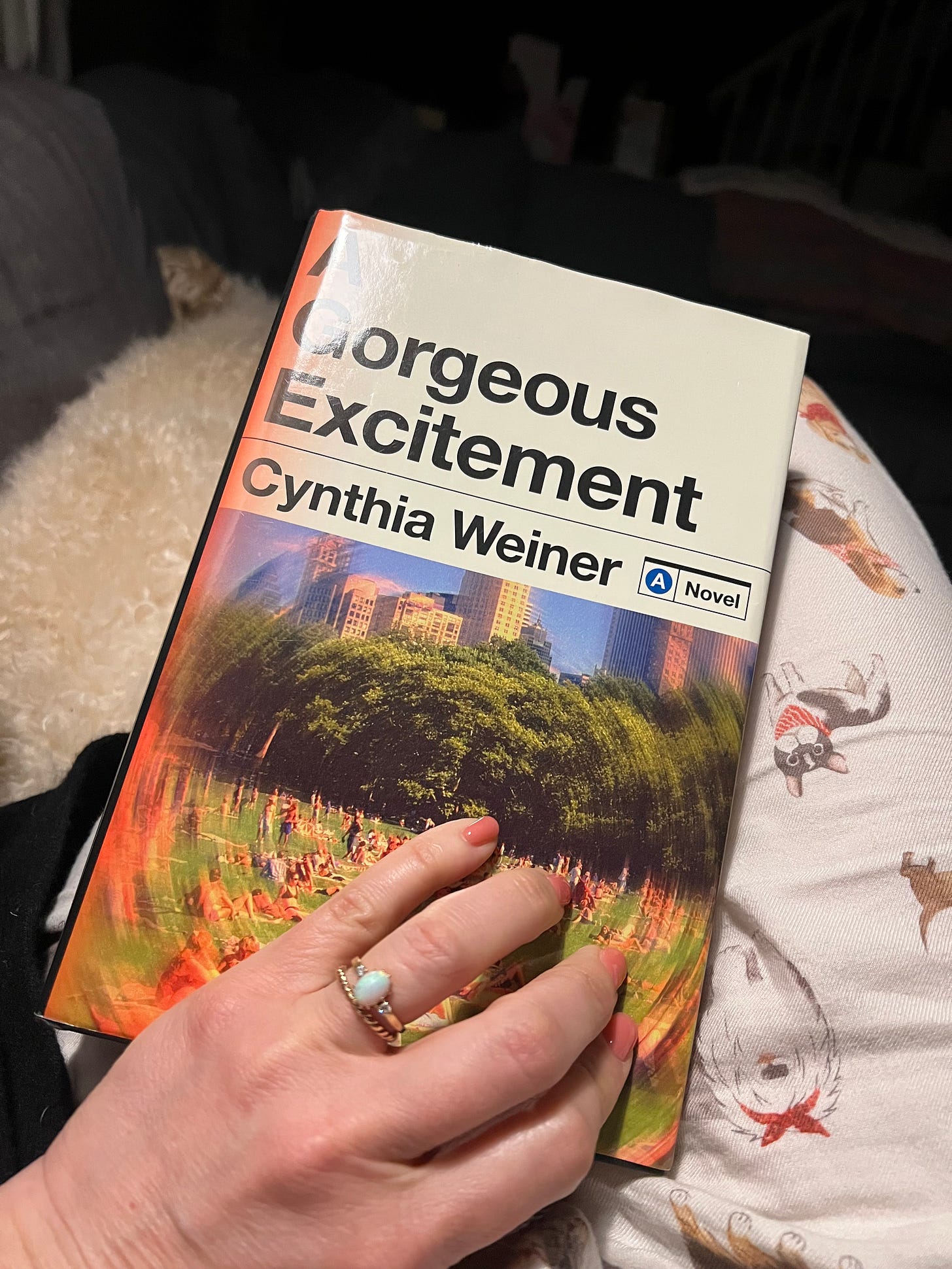
Sometimes a novel feels like it was written just for you, right? Cynthia Weiner’s brilliant debut felt this way to me, more so than any novel I’ve read since Daisy Alpert Florin’s 2024 debut My Last Innocent Year. Do you have novels of this ilk? Does everyone? (Those are real questions.)
Loosely based on the “Preppy Murder”—a crime than defined the 80s for New Yorkers—A Gorgeous Excitement follows eighteen-year-old Nina Jacobs through the summer following her graduation from an elite Upper East Side girls school, as she strives to lose her virginity, ideally with Gardner Reed, glossy poster boy for Manhattan’s WASPy elite. But, folks, this is not Gossip Girl: Written in ferocious, near-lyrical prose, this brilliant novel carefully limns Nina’s consciousness with tender emotional acuity and intense sociocultural awareness. Weiner perfectly captures—and examines—the class fault lines, the antisemitism, the misogyny of the 1980s, shining a light on the way the mythology of that era informs our lives today. I loved this novel in a way I’m struggling, here, to express and will return to it soon.
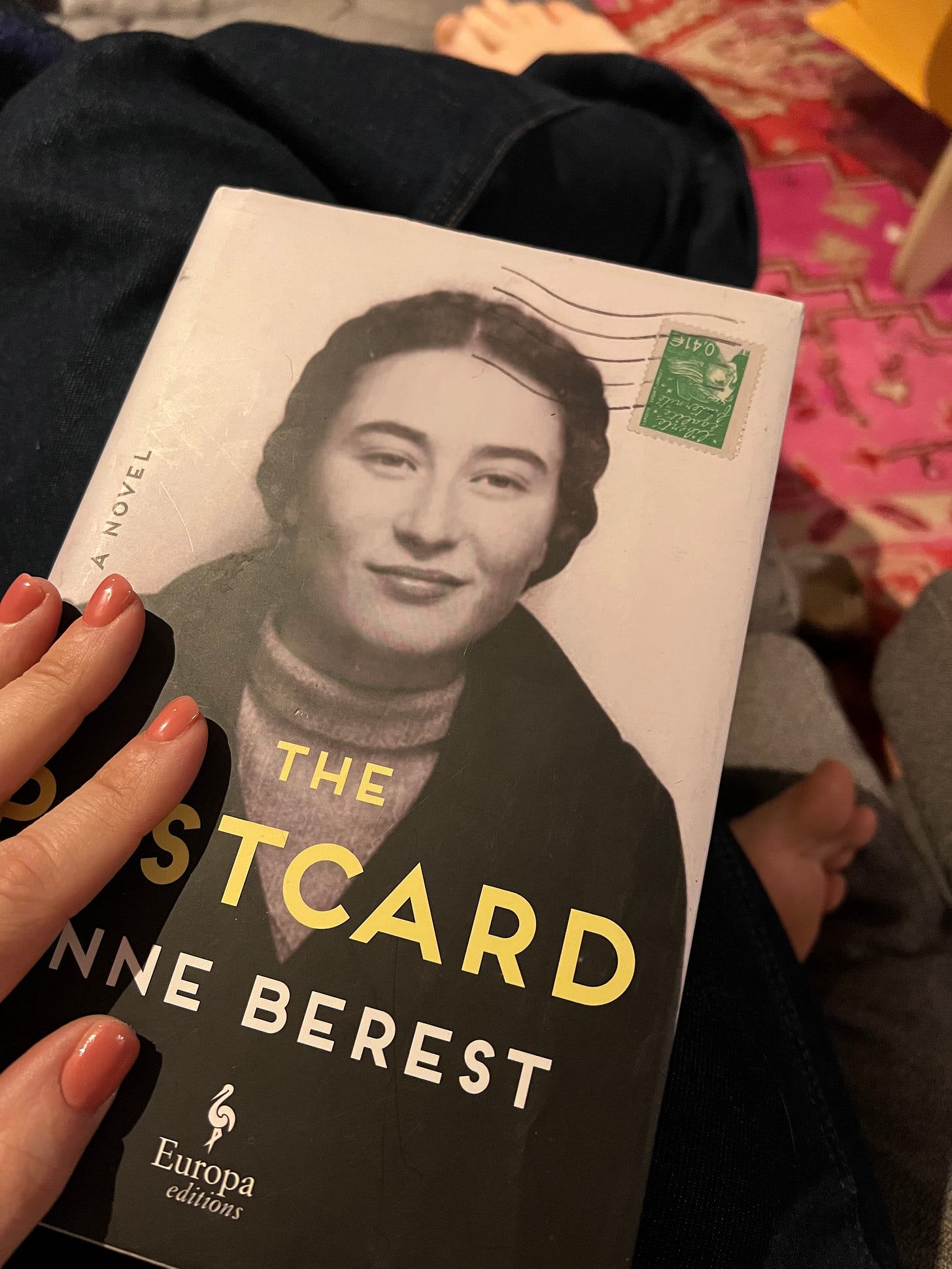
The Postcard, Anne Berest
I spent four-plus years editing the Jewish culture magazine Tablet—before it became a conservative screed—during which time a dozen Holocaust or Holocaust-adjacent books crossed my desk every week. (Maybe more.) When I left, I knew I needed to take a long break from the subject, to preserve my mental health, and so when a writer-friend ardently insisted I pick up Anne Berest’s The Postcard, I did so but let it sit on my bookshelf for more than a year. Until Trump’s inauguration, when this virtuosic, epic novel, which meticulously chronicles the dehumanization of Jews throughout Europe, suddenly felt as urgent as the Times’ headlines. Based on Berest’s own inquiry into her mother’s family’s wartime experiences, the novel begins with a bang: Berest’s mother, out of nowhere, receives a postcard containing only the names of her family members, murdered in Auschwitz. Who would send such a cruel, menacing missive? And why? Berest and her mother tuck the card away for fifteen years, when Berest—a mother herself—decides to investigate. In crisp, commanding prose, Berest takes the reader with her, as she discovers a story far greater, and more universal, than she expected, imagining her way into the lives of her remarkable forebears—the joyous sections about her remarkable Great Aunt Noemie broke my heart—and I felt, as I read, lucky to be along for the ride. Unforgettable and hugely important. Also: The brilliant critic
wrote a great piece about Berest for The New Yorker.Post-Traumatic,
In our productivity-oriented culture, the ultimate praise for a book tends to be: “a page turner.” Or, you know, “I couldn’t put it down!” But some books, of all sorts, demand to be read slowly. Since childhood, I’ve read collections of poetry and short stories slowly, one piece at a time, over months. (For most of my life, I’ve had a habit of keeping my current poetry read by the side of my bed, and reading one poem each night, just before turning off the light.)
I was thinking about this over the months—yes, months—in which I slowly read Chantal V. Johnson’s deeply affecting novel Post-Traumatic. Which I loved and which—like the best fiction—led me to a deeper understanding of myself and my world, and also my own work, which has overlap with Johnson’s urgent, meticulously-written novel in that it very much looks at the terrifying vulnerability of being a woman alone in a city.
When Post-Traumatic begins, Johnson’s thorny heroine, Vivian, works as a lawyer at a psychiatric hospital, defending the rights of the adolescent girls committed there, a job that consumes her heart and mind, though she’s a cool enough customer that she’d never put it like that. On the surface, she’s a success story, having made her way out of a brutal, abusive home, through college and law school, into an of-the-moment wardrobe, a Brooklyn apartment, and an impossibly toned body. But the self-discipline, intellect, and ambition—and fierce sense of humor, and sense of self—that got her there is tempered by, and also fueled by, the psychological scars from her past. Of course. The novel follows her as she reaches the breaking point, basically, and comes out the other side. And, as I said, for me, the emotional intensity meant reading this novel very slowly, in small pieces, which I’d think about in the days that followed before diving in again. It’s a brilliant book, a tour de force, and no less so—certainly—because it doesn’t demand to be inhaled.
SHORTER READS
This beautiful, wise essay from
, about living through the LA fires, made me cry and also understand my own brain a bit better. “But what I do know now is that this fire hadn’t come to destroy me; it came to show me what was indestructible.”The journalist Alissa Quart is largely known for her brilliant books on economic hardship—most recently Bootstrapped—but she’s also one of the best poets of our day. In her most recent essay, for Time, she beautifully suggests reading poetry instead of doomscrolling. A must-read for anyone struggling right now. (Is anyone not?) “It’s not just a matter of seeking solace. These poems display a range of stances when encountering social extremes. They can ultimately offer us some moral direction.”
A FEW AMAZING COMMENTS FROM ALL OF YOU
“I whole heartedly agree with your way of teaching memoir! I am currently writing a memoir on my complex and abusive relationship with my ex-husband and this is a question I always ask myself: “What is my intention here? Love, or revenge?” If it wasn’t love, every single time, I wouldn’t be able to continue writing. And as strange as it sounds, I can find plenty of love for the man who once made my life an absolute misery, and gratitude I’m no longer with him.”
offers this quote from Howard Zinn as a balm to our dark times: "Remember those times and places—and there are so many—where people have behaved magnificently; this gives us the energy to act, and at least the possibility of sending this spinning top of a world in a different direction.” Thank you, Kersty. I needed to hear this.IF YOU’D LIKE TO STUDY WITH ME!
I teach once a year, and this year I’m doing so on Zoom, in May, via amazing Boston writing school Grub Street! Scholarships are available for both classes but enrollment is limited and spots are definitely filling up! Here’s the info:
Finding and Refining Your Book-Length Story: Memoir and Nonfiction. This is basically a four-part memoir master class. May 6, 13, and 20, 10:30am-12:30pm, and May 28, 6:30pm-8:30pm.
More Than Just a Book Cover: How to Be Your Authentic Self on Instagram. Alternate title: How to use Instagram to make you a better writer, rather than allowing it to use you, rotting your brain and destroying your life. May 27, 6:30-8:30pm
IF YOU’D LIKE TO SEE ME IN PERSON
April 29, 7pm, Booked Author Series, Fleur Providence, with
, , Kristal Koval, and Gaige.May 15, 6:30-8pm, virtual, More Than Just the Book Cover: How to Be Your Authentic Self on Instagram, a one-night seminar for Grub Street. Register here (spots limited).
May 6, 13, 20, 27th, 10:30am-12:30pm, virtual, Finding (and Refining) Your Book-Length Story: Memoir and Nonfiction; in this four-installment master class, we’ll break down the elements of great memoir, from finding the story (rather than the subject), to tone and style, to character building. Also for Grub Street. Register here (spots limited).
May 6, 7pm, Barnes and Noble Upper West Side, in conversation with
, about her new novel Shopgirls (which is soooooooo good)May 21, 6pm, Show Up Inc., in conversation with visual artist Caron Tabb about her solo show A Stone In My Shoe
May 30, Brookline Booksmith, in conversation with Kevin Wilson, about his new novel Run for the Hills.
June 4, Brookline Booksmith, in conversation with public radio’s Sarah Yahm, about her debut novel Unfinished Acts of Wild Creation
June 10, Must Love Memoir, Jake’s Dilemma, NY, full lineup TBD
June 11, Harvard Bookstore at the Cambridge Public Library, with
, discussing the anthology What My Father and I Don’t Talk About, in which we both have new essays! (She’s also the genius behind the book.)June 12, Newtonville Books, in conversation with legendary editor, poet, novelist, memoirist, genius Jill Bialosky about her brilliant new memoir The End is the Beginning: A Personal History of My Mother
If you missed my February column, you can find it here:


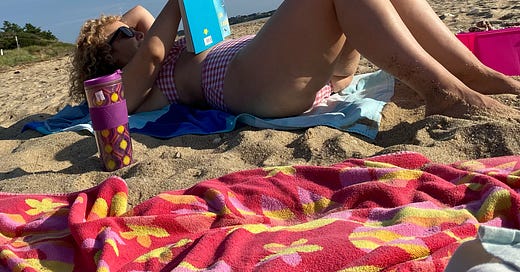



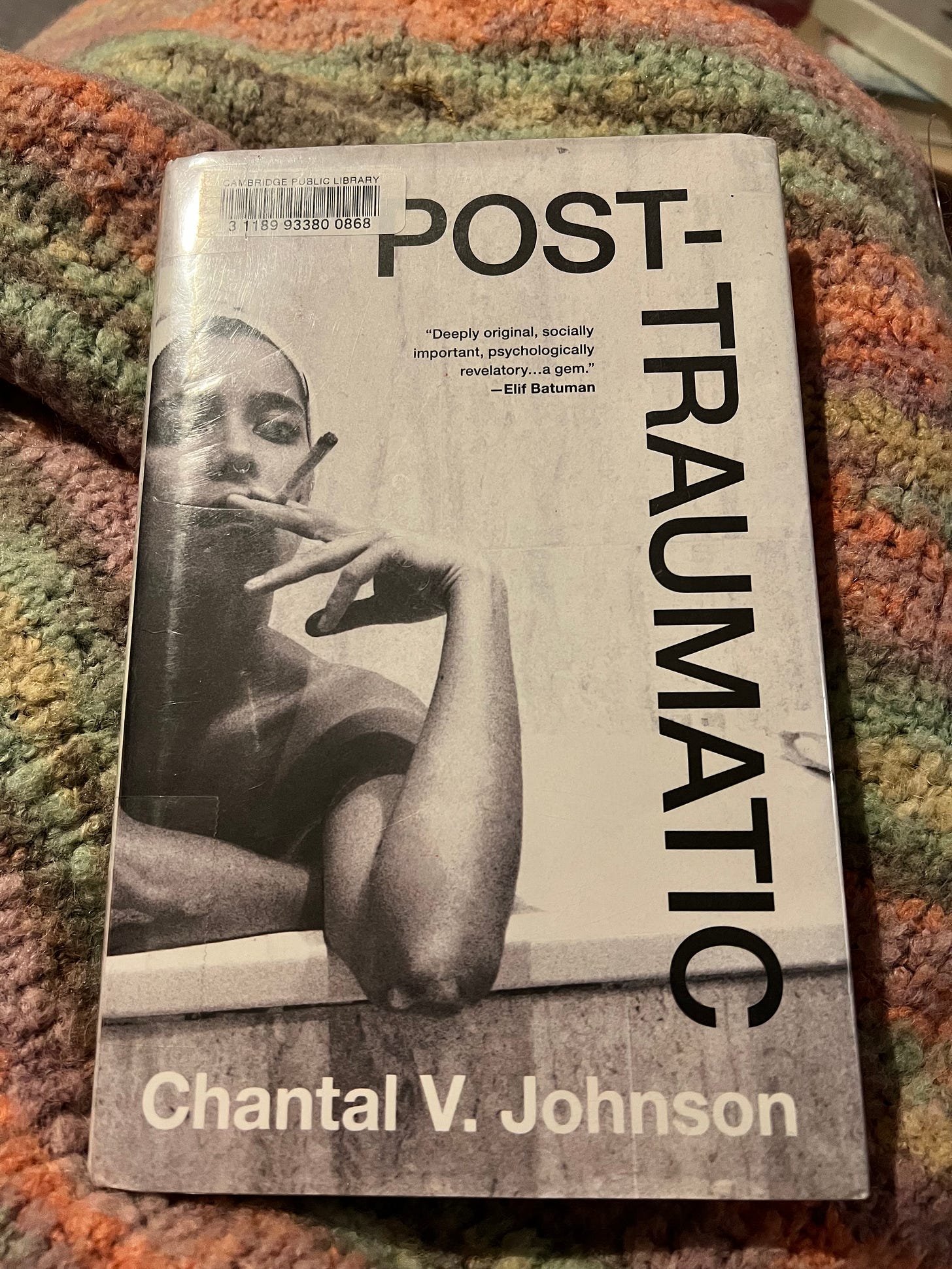
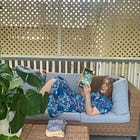
I really loved this, especially this bit "This misguided notion constructs the writer—me—not as an active intelligence engaged with a piece of literature, offering a carefully calibrated assessment of its cultural and societal and artistic importance, but as, let’s say, a consumer, offering up product recommendations..." SO GOOD AND SO TRUE!!
I agree with your myths. I've always thought of my blog posts as a part of my process and as critical reflections of my own work.